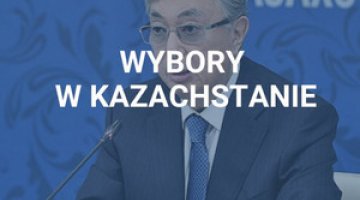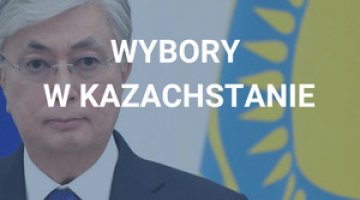Kazakhstan: elections without an alternative
On 20 November, the incumbent head of state Kassym-Jomart Tokayev won early presidential elections in Kazakhstan. According to official data, he won 81.3% of the vote, defeating five other candidates, persons who were largely unknown to the public (who won 2.1–3.4%). 5.8% of voters did not support any candidate and chose the option of voting ‘against all’. The turnout was 69.4%. In its statement published the day after the election, the ODIHR-OSCE election observation mission pointed out a number of shortcomings, in particular the lack of real competition (preventing genuinely independent candidates from running) and the incomplete transparency of the vote counting process. At the same time, it pointed to progress in the handling election protests.
Commentary
- The election consolidated Tokayev’s position, reaffirming his unquestioned sole authority (including control of the state apparatus), and symbolically renewing and strengthening his legitimacy. In the previous election in June 2019, Tokayev stood as a protégé of the long-time state leader Nursultan Nazarbayev, who resigned but retained a number of prerogatives allowing him to influence current politics and limiting the new president’s power. But after violent public protests and unrest in January this year, resulting in the most serious crisis in the history of independent Kazakhstan, Tokayev gradually removed Nazarbayev’s prerogatives, including the post of president of the Security Council (see ‘Kazakhstan: work starts on dismantling the Nazarbayev system’). At the same time, he prepared a package of reforms aimed at improving the management of the state and, in the strategic perspective, strengthening Kazakh statehood in the face of the threat from Russia following its aggression against Ukraine. These were adopted in the form of amendments to the constitution in a referendum on 5 June (see ‘Tokayev’s Perestroika. Kazakhstan in the face of internal and external challenges’). The current election symbolically ends the process of Tokayev’s political emancipation; in the absence of wider political base and significant financial resources, he chose to make an appeal to the ‘will of the people’ before the end of his term. Starting with this election, presidents in Kazakhstan will be elected for a single, seven-year term.
- The serious concerns expressed by the ODIHR-OSCE mission point to systemic shortcomings and irregularities (a detailed assessment of the elections will be included in their final report in a few months). In particular, the lack of competitiveness was highlighted, as no independent candidates were able to run. The existing requirements concerning education or work experience in the state structures or elected positions were seen as contradictory to the OSCE’s principles and international standards. Attention was also drawn to the de facto limitations on freedom of speech and access to information, which is inconsistent with Kazakh legislation (cases of journalists being attacked and intimidated were reported). The high rating given to the technical aspects of the election process (training commission members, equipment at polling stations, general observance of election-day procedures) was lowered by numerous shortcomings in vote counting and tabulation. At the same time, in the context of the upcoming parliamentary elections, the opinion was expressed that there is still room to resolve the indicated problems.
- The election showed that the situation in Kazakhstan is stable: Tokayev’s power is unquestioned in the political dimension, and at least passively accepted by the majority of society (the election was not accompanied by protests). The early parliamentary elections, announced for the first half of 2023 (the last were held in January 2021), will be the test of ‘Tokayev’s perestroika’. The most important question seems to be whether and to what extent the constitutional amendments facilitating party registration, as well as the mixed electoral system being introduced, will initiate real pluralism on the political scene. At the same time, it should be assumed that the process of decentralising power and increasing public participation in political life – if the direction of reforms and Tokayev’s determination to implement them is maintained – will take some considerable time. In Kazakhstan, alternative forces capable of achieving success in the upcoming elections have not formed, and the state apparatus is at the very least reluctant to genuinely pluralise public life. Regardless of this, the government’s current policy and public sentiment, and consequently the future of the reforms, are strongly dependent on the international situation. Russia’s aggression against Ukraine has reinforced anxiety in Kazakh elites, which, together with the January crisis, has activated patriotic and nationalist sentiments among the public. Russian pressure – or even the mere threat of it – may on the one hand favour the consolidation of power and society, thus inhibiting reforms; but on the other hand it could lead to an increase in internal tensions and conflicts.



